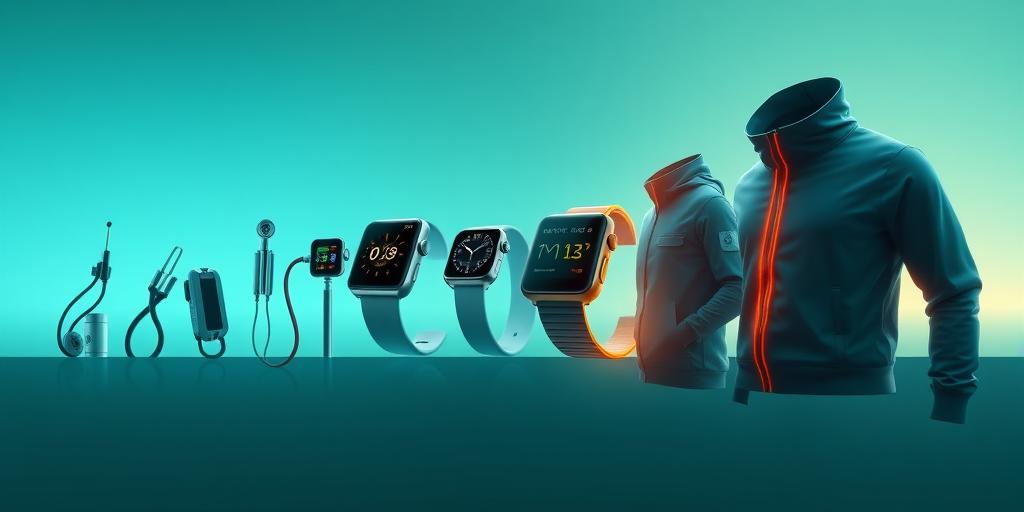The healthcare industry is on the cusp of a technological revolution, and wearable technology is leading the charge. From fitness trackers to advanced medical sensors, wearables are transforming how we monitor, diagnose, and treat health conditions. But what does the future hold? Let’s delve into the exciting evolution of wearable technology in healthcare and discover how it will continue to shape the landscape of medicine. This is not just another tech trend; it’s a medical revolution! Prepare to be amazed!
Continuous Health Monitoring: The Dawn of Personalized Healthcare
Imagine a world where your health is constantly monitored, allowing for early detection and prompt intervention. This is the power of wearable technology. Advanced sensors embedded in smartwatches and patches can track vital signs such as heart rate, blood pressure, and even blood glucose levels in real-time. This continuous data stream empowers healthcare providers to identify potential health issues long before they become critical. This is truly the future of preventative healthcare. We are talking personalized medicine at its finest!
Beyond Fitness Trackers: The Next Generation of Wearable Sensors
The evolution of wearable sensors extends far beyond simple fitness tracking. We are now seeing the development of sophisticated devices capable of detecting subtle changes in physiological parameters, allowing for the early detection of conditions like heart failure, arrhythmias, and even certain types of cancer. The integration of artificial intelligence (AI) further enhances the capabilities of these devices, allowing for more accurate and timely diagnoses.
The Rise of Remote Patient Monitoring (RPM)
Remote Patient Monitoring (RPM) leverages wearable technology to provide continuous health monitoring for patients outside of a clinical setting. This is particularly beneficial for patients with chronic conditions, allowing for proactive management and reducing the need for frequent hospital visits. This not only improves patient outcomes but also significantly reduces healthcare costs. This is a game-changer for both patients and the healthcare system. The convenience and efficiency are unmatched!
Wearable Tech in Diagnostics and Treatment
The applications of wearable technology extend beyond monitoring; it is also playing an increasingly important role in diagnostics and treatment. Smart patches that can administer medication or deliver electrical impulses are already being developed. This technology has the potential to revolutionize drug delivery and the treatment of chronic diseases. Imagine a world where medication is delivered precisely when and where it is needed, maximizing efficacy and minimizing side effects. This level of precision is extraordinary!
Smart Patches and Drug Delivery Systems
Smart patches are changing the game. They are miniature laboratories on your skin, capable of monitoring your vital signs and delivering medication as needed. These advanced patches can adjust drug dosages based on real-time data, optimizing treatment and minimizing adverse effects. This technology is paving the way for personalized medicine, ensuring that each patient receives the optimal dosage of medication, precisely when they need it. The possibilities are truly endless!
Wearable Devices in Therapy and Rehabilitation
Wearable technology is transforming the field of physical therapy and rehabilitation. Smart devices can monitor patient progress, provide real-time feedback, and even adapt treatment plans based on individual needs. This results in better patient outcomes and reduces the need for extensive, in-person therapy sessions. Wearable technology is making physical therapy more accessible, convenient, and effective.
The Challenges and Opportunities Ahead
Despite the tremendous potential, there are still some challenges to overcome. Data privacy and security are major concerns. The increasing amount of personal health data collected by wearables raises concerns about data breaches and unauthorized access. Ensuring the accuracy and reliability of wearable sensors is also crucial. Inaccurate data can lead to misdiagnosis and inappropriate treatment. However, the opportunities far outweigh the challenges. The future of healthcare is undeniably intertwined with the evolution of wearable technology.
Addressing Data Privacy and Security Concerns
Addressing data privacy and security concerns is critical. Strong encryption protocols, robust data governance policies, and user-friendly data control mechanisms are essential to build trust and ensure the responsible use of personal health data. This requires collaborative efforts between technology developers, healthcare providers, and regulatory agencies.
Ensuring Accuracy and Reliability
Ensuring the accuracy and reliability of wearable sensors is paramount. Rigorous testing and validation procedures are needed to ensure the data collected is accurate and reliable. Continuous improvement and advancements in sensor technology are essential to minimize errors and improve the accuracy of health assessments.
The Future is Wearable: Embracing the Revolution
The integration of wearable technology into healthcare is accelerating rapidly. From continuous monitoring to advanced diagnostics and treatment, wearables are transforming healthcare as we know it. While challenges remain, the opportunities presented by this technology are immense. By embracing the possibilities, we can create a healthcare system that is more personalized, efficient, and effective.
Ready to become a part of this healthcare revolution? Explore the latest advances in wearable technology and witness firsthand how these innovations are shaping the future of medicine. Don’t miss out on the chance to be at the forefront of this exciting evolution!




